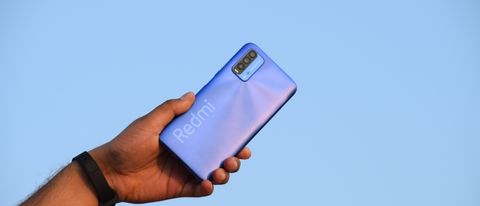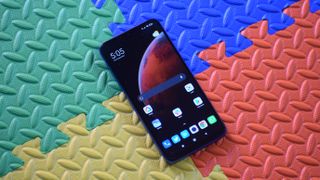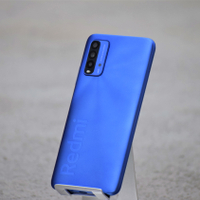TechRadar Verdict
The Redmi 9 Power sits between the Redmi 9 Prime and the Redmi Note 9 in Xiaomi’s crowded budget smartphone lineup. While features such as a 48MP camera stack, a Full HD+ display and fast charging capabilities are cool, the show stopper is definitely the massive 6,000mAh battery, offering incredible backup. However, the device is held back by subpar performance and MIUI.
Pros
- +
Battery life
- +
Full HD+ display
- +
Stereo speakers
Cons
- -
Subpar performance
- -
MIUI
- -
Average cameras
Why you can trust TechRadar
Two-minute review
If there is one series from any smartphone maker in India that was proactive throughout the year, it has to be the ‘9 series’ from Xiaomi under the Redmi lineup. The company launched as many as eight smartphones under the 9 series including the Redmi Note lineup. The latest in the series is the Redmi 9 Power, which as the name suggests, comes with a massive battery.
The Redmi Note 9 Power is a budget phone that is priced under Rs 12,000 in India. It sits right between the Redmi 9 Prime and Redmi Note 9. Xiaomi says the Redmi 9 Power is built on top of the success of the previous Redmi number series devices. It takes the goodness from the number series and takes it one step ahead of the Redmi 9 Prime which was launched a few months back in India.
For starters, the Redmi 9 Power comes with a 6.53-inch Full HD+ display which is good at this price point. You also get Widevine L1 certification and Corning Gorilla Glass 3 protection. Under the hood, the device has a Snapdragon 662 SoC, which is an entry-level chipset from Qualcomm. The performance is extremely basic here; you will see a reasonable amount of lag and stutter, and MIUI makes it even worse with heavy skin and 4GB of RAM. The user experience here is underwhelming and not meant for heavy users or multitaskers.
On the brighter side, the 6,000mAh battery can last you one and a half days on a single charge and more if you are not a heavy user. However, be ready to keep the device to charge for around 3 hours to fully charge. The rear camera sports a 48MP Samsung GM1 sensor which is a rarity at this price point. The output is pretty decent but could have been better if optimized well enough by Xiaomi. The 8MP selfie camera does the job but don’t expect anything exceptional here.
The design is also a new addition on the Redmi 9 Prime. It comes with Aura power design and a textured finish which gives a striking look. And along with a large Redmi logo embossed on the back, which is a first for the company, it is easy on the eye. Other meaningful additions like an IR blaster, side-mounted fingerprint sensor, stereo speakers, dedicated microSD card slot, 3.5mm headphone jack, splash-proof design, Corrosion-proof and rubberized ports are also present. If you are not a heavy user and looking for a secondary phone with great battery life, good display and audio phone, the Redmi 9 Power can be considered.
Redmi 9 Power price in India and availability
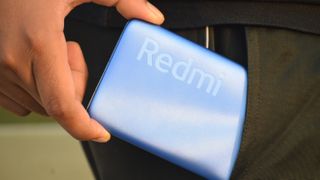
The Redmi 9 Powered comes in two configurations in India. The base variant with 4GB of RAM and 64GB storage is priced at Rs 10,999 while the 128GB variant is priced at Rs 11,999. The device is available on Amazon. It is available in four colour options- Mighty Black, Blazing Blue, Electric Green, and Fiery Red.
Redmi 9 Power vs Redmi 9 Prime vs Redmi Note 9 quick comparison
| Header Cell - Column 0 | Redmi 9 Power | Redmi 9 Prime | Redmi Note 9 |
|---|---|---|---|
| Display | 6.53” FHD+ | 6.53” FHD+ | 6.53” FHD+ |
| Processor | Snapdragon 662 | Helio G80 | Helio G85 |
| RAM | 4GB | 4GB | 4/6GB |
| Storage | 64/128GB | 64/128GB | 64/128GB |
| Rear camera | 48+8+2+2MP | 13+8+5+2MP | 48+8+2+2MP |
| Front camera | 8MP | 8MP | 13MP |
| Battery | 6000mAh , 18W | 5020mAh, 10W | 5020mAh, 22.5W |
| Starting price | Rs 10,999 | Rs 9,999 | Rs 11,999 |
Design
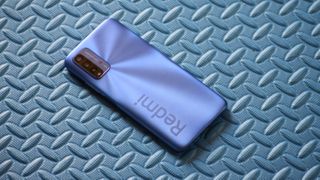
The Redmi 9 Power has a new approach in terms of design. Instead of mundane look, it is good to see Xiaomi trying out the different finish on the rear panel. The device comes with a textured finish which Xiaomi calls Aura power design. The back generates a radial pattern which looks like a light wave coming out from the edge of the camera module. The detail on the rear changes as the light falls. The device is available in four colour options in Mighty Black, Blazing Blue, Fiery Red and Electric Green.
The textured pattern doesn’t give the best in-hand grip and you might want to use the transparent screen which is given in the box. In spite of the massive battery, the weight of the device is kept under 200 grams. At 198 grams, the Redmi 9 Power weighs the same as the Redmi Note 9 and Redmi 9 Power. The weight distribution is also done really well here and the device does not feel as heavy as you’d think.







On the right side of the device, you get a fingerprint scanner which is embedded in the power button - an ideal placement in my opinion. It can be reached with a single hand easily and the fingerprint works flawlessly. Above the power button, you get the volume rocker which has a nice tactile feedback. To the left of the device, there is a SIM card tray which takes in two nano-SIMs and a microSD card.
At the top, you get the 3.5mm headphone jack, IR blaster and the Type-C port and the speaker is present on the bottom of the device. On to the front, you get a Full HD+ display with a dew-drop notch which houses the selfie camera. Right above the selfie camera, there is an earpiece that also doubles up as a speaker creating stereo output. To the back, the device sports a quad rear camera setup with the camera module that protrudes fairly.
The overall body of the Redmi 9 Power is plastic and the outer frame is built pretty well. The device feels nice to hold and doesn’t feel cheap and is one of the best-balanced devices in the segment. The colour options are also pretty good. For the review, we are using the Blazing Blue colour options, which is really good and eye-catching. Apart from this, I also like the Electric Green and Fiery Red variants.
Display
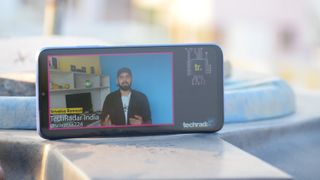
The Redmi 9 Power sports a 6.53-inch Full HD+ display. It is an LCD panel with a resolution of 2,340 × 1,080 pixels with a 19.5:9 aspect ratio and 400 nits of peak brightness. A layer of Gorilla Glass 3 sits on top of the display. Furthermore, it is also TÜV Rheinland certified for low blue light emission.


The display supports colour temperature adjustment, reading mode, and sunshine mode. The device is also Widevine L1 certified which means you can enjoy streaming the HD content from apps like Netflix and Prime Video. The display produces vivid and crisp colours as for the LCD standards. There were also no colour shifts during the testing period.
It’s good to see Full HD+ display at this price point from Xiaomi again. The LCD panel produces good colours and the viewing angle is also good here. The display is good for indoor usages and it's just readable outdoors but, I’d liked to see more brightness personally. The big Full HD+ display coupled with stereo speakers makes watching content on the device sweeter. The handset has slimmer bezels on the side while you get a fair amount of bezel on the top as well as on the chin.
If only the display had a better peak brightness, this would have been the best in the segment.
Performance
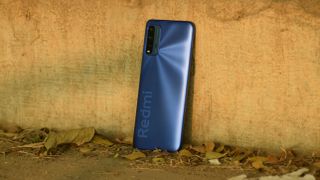
Under the hood, the Redmi 9 Power is powered by a Qualcomm Snapdragon 662 chipset. It is an octa-core chipset built on an 11nm fabrication process which runs at a max frequency of 2GHz and has a third-gen AI engine. Gaming and graphics performance will be taken care of by Adreno 610 GPU. This is also the only Redmi 9 series device to sport Snapdragon Chipset.
The Redmi 9 Power is available in two configurations in India - 4GB LPDDR4X RAM and 64GB (USF 2.1) of storage and the other variant packs in 128GB (UFS 2.2) storage. You also get a dedicated microSD card slot. We’d have liked to see a 6GB variant of the device but going by the previous track record, the Poco M3 might pick the top-end variant with 6GB of RAM in the near future.
The real-life performance of the Redmi 9 Power is a mixed bag. During my testing, I made it my primary device for a period of 10 days and installed social media apps like WhatsApp, Instagram, Facebook, and Snapchat. Apart from this, I had Slack, Gmail for work purposes while there were a couple of games and a few more music, shopping, and photos related apps.




The phone struggled when I was switching between apps, which took time to load and during the switching process, the apps reloaded nine out of ten times. Quite a frustrating experience. For instance, when I open chrome and take a screenshot to post on Instagram and when I come back to Chrome back to copy the link, the page reloads again. Apps are not kept running in the background even if it’s just a matter of a few seconds. The device felt sluggish even while using 2-3 apps regularly. There was no app crash or system crash during my time with the device.
With this kind of optimization, it doesn’t make sense to keep any app in the background. Overall, memory management and optimization are really bad. Unless this issue is fixed via an update, we’d recommend staying away from Redmi 9 Power if you are a heavy user.
The benchmark scores are pretty similar to the Moto G9 Power which is also powered by the same chipset. But the performance is opposite to what we’ve seen here. It looks like the stock Android interface on the Moto G9 Power makes the device run smooth.
As for gaming, we tried games like Asphalt 8, CoD Mobile, and Real Racing - all of them performed fairly well. All the games were handled fairly well in the medium graphic settings and so the gaming performance was smooth given the price point. The massive battery gives you a longer duration of playtime.
Software
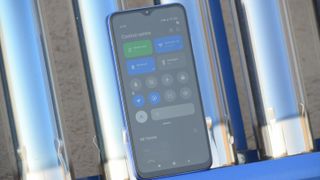
Xiaomi’s MIUI 12 skin sits on top of Android 10. If you have used any of the Xiaomi devices, you know what you’re getting into. The skin is heavy but customizable - the options feel limitless. You get system animations which feel quite smooth on the device. You also now get an option to switch to Google feed on the -1 screen. Also, you can customize the home screen, app drawer, icons and settings screen looks.
Although Xiaomi has reduced the number of ads, push notifications, and NSFW content, the experience is still not as Ad-free as you’d get on premium Mi phones or even Poco phones. The unnecessary notifications can be easily switched off with a long press and turning off notifications. Some of the annoying notifications I received were - update apps from GetApps store and memory-booster. I also disliked how Xiaomi posts an ad when you install an app from the play store. The device also comes with bloatware, most of which can thankfully be uninstalled.


In MIUI 12, the visual that appears in the storage section is my personal favourite. You get a tall cylinder with multicolour discs which tells you what exactly is taking up your storage space. System-wide sliders including calls, alarm, media, and others have also gained the fluid animations. Uninstalling apps are also fun as there is new animation for that too, which explodes and pushes the app icons around it.
For those who are bored with the regular notifications pane, Xiaomi offers an option to switch to the Control centre. Inspired by iOS, using this will take away the regular notification shade and the quick setting options. Instead, you get the all-new Control centre. This can be accessed by swiping down on the right side of the device. Swiping on the left will give you the notifications at a glance. These can also be customized.
You also get floating window functionality. You can create a floating window by long-pressing any supported application in the recent screen. With MIUI 12 Xiaomi has finally added support for Google’s standard on-screen navigation gestures. You can go back by swiping on either side of the device. A full swipe up from the home screen will bring you back to home while holding it will take you to the recent.
MIUI 12 has gained a lot of features in recent times and our only gripe was that Xiaomi pushed too many notifications, ads and made the user experience bad. We also wish the device was more optimized with the chipset to run it smoother.
Camera
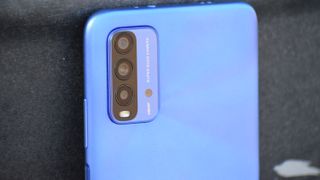
Xiaomi introduced the 48MP camera setup to the budget segment a couple of years ago with the Note series. And, now the Redmi 9 Power comes with a 48MP Samsung GM1 primary shooter with f/1.79, an 8MP ultra-wide lens with a 120-degree field-of-view, 2MP macro lens and a 2MP depth sensor. To the front, there is an 8MP shooter which is located inside the dew-drop notch. It has an f/2.0 aperture.


The camera features include Pro mode, photo, video, portrait, night, 48MP mode, short video, panorama, doc mode, slow-mo, time-lapse, Google Lens integration, movie frame, pro colours, and more. You can shoot videos up to Full HD @ 30fps.










The 48MP shooter clicks at 12MP by default which gives good bright-looking photos with crisp colours. Often, these pictures feel a bit oversaturated as the AI mode was turned on. The dynamic range and white balance is not the best but fairly acceptable at this price point. You’ll be happy with the results and these pictures look on social media as well. The images are not too sharp and the edges produce noise and lose out on detail.








The 8MP wide-angle camera produces a wider field of view shots but it loses out on details. The images lose on sharpness and look washed out often.








The portrait images taken come out good and acceptable. Although the edge detection is not perfect, the device does a good job here. The 2MP macro camera struggles to capture detailed images thanks to the slow shutter speed and focusing issue.
The night shots taken through the device came out surprisingly good. The images were taken in night mode, reducing grains and bringing light on some of the darker areas. You get slightly better-detailed shots in the night mode.
As for the video recording, the device can go up to Full HD @ 30fps and there is no support for any stabilization which makes the recording less enjoyable. You can also shoot slow-mo and short videos.
The selfie camera takes good images in the daylight while the edge detection in portrait mode was decent. The selfies in the low-light mode were average at best with noise and fewer details.
Battery
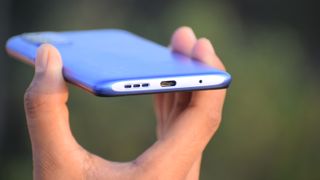
The Redmi 9 Power packs in the biggest battery on any Xiaomi device yet with a 6000mAh unit. It supports 18W fast charging via Type-C interface. However, the company is bundling a 22.5W charger in the box.
Further, the phone supports QC 3.0 fast charge protocol as well as OTG reverse charging to charge other devices using the Redmi 9 Power. Just like many other Xiaomi devices, it also comes with a long cycle battery which is said to last 25% longer than other smartphones.
In my usage, the device lasted for about one and a half-days before I had to plug in for charging. I got around 8 hours of screen time regularly. With medium usage, the battery can last up to two days. Refuelling takes more than three hours so it is recommended to charge it overnight. The battery life is definitely something that the Redmi Note series has been doing from the past few years and now with the Redmi 9 Power, it takes one step ahead with massive battery and extended battery life. The massive battery here is a double edge sword here - while you get long-lasting battery life, it is a pain to keep the phone to charge for more than three hours in the middle of a day.
Everything else




As for the audio, the device’s stereo speakers are loud and crisp which makes watching content more enjoyable. The speakers also support Hi-Res audio output. The Redmi 9 Power also comes with a 3.5mm headphone jack and IR blaster which works as expected.
The call quality was good and I did not face any issues. As for connectivity, you get dual-band Wi-Fi and Bluetooth 5.0 onboard. The side-mounted fingerprint scanner is quick and reliable. Face unlock also works as intended.
Verdict
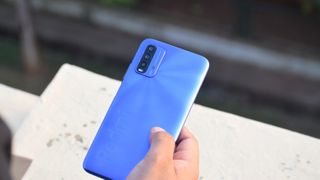
Buy it if...
You want all-day battery life
The Redmi 9 Power’s USP is the massive battery life which can last for at least one and a half-day to two days even if you are a heavy user.
You watch a lot of content
The budget segment lacks a big screen and stereo speaker combo but, the Redmi 9 Power brings it here. If you watch a lot of movies, shows, the high-resolution display and dual front-firing speakers are great to binge-watch.
You want a phone with good build and design
While the plain and colourful back design is getting common, Xiaomi tried a new design with Redmi 9 Power which really stands out from the crowd. You also get in four colourways.
Don't buy it if...
You can expand your budget a bit
If you can extend your budget by Rs 2,000, you will get Redmi Note 9 and other good options which offer better performance and value for money.
You want a clean User experience
Xiaomi’s MIUI brings a bunch of apps pre-installed and there are spammy push notifications and ads. The skin feels heavy at times and often brings down the performance.
You want snappy performance
The Redmi 9 Power is not the snappiest phone in the segment and it showed us consistently inconsistent performance throughout our time with the device. That said, you can have a look at our best budget phones and get the best one that suits your requirement.
Srivatsa is a prolific writer who spearheads the core writing team on tech news, buying guides, reviews, and all gadget articles. He is passionate about technology.

Can’t uninstall or update your Microsoft Store apps? Weird Windows 10 bug has just been fixed, thankfully

The end of Google Fit? Fitbit looks set to replace it on future Android phones – and bring its AI coach with it

Black Friday Dyson deals live: we're hand-picking all the best vacuum and haircare deals
